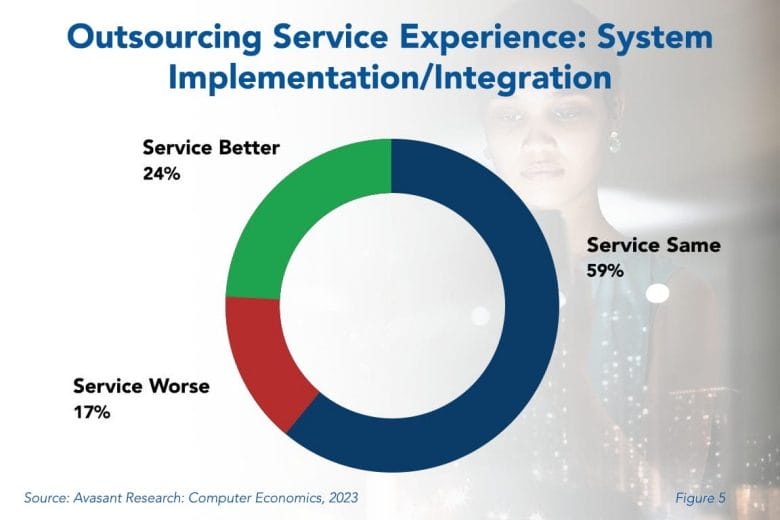While many outsourcing decisions are influenced by the need to save money, system implementation/integration outsourcing differs. In the case of system implementation/integration, the primary motivation is to ensure project success. Our study finds that IT organizations are more successful in improving service levels through outsourcing than they are at reducing expenses, indicating that the quality of the service, not cost, is the driving factor.
Real expertise is needed to configure new enterprise systems to align with the business, convert legacy data, and integrate with external and internal systems. But system implementation/integration is getting more complicated as new technologies and methodologies emerge, and few organizations today have the skills, experience, and desire to do it with in-house personnel alone. Furthermore, a significant number of those outsourcing this function say they have the same or better service than if they completed it in-house.
As shown in Figure 5 from our full report, System Implementation/Integration Outsourcing Trends and Customer Experience, most customers report a positive service experience. A total of 83% say service is either better or the same when system implementation/integration outsourcing is involved,while only 17% experience worse service. Though some struggle to see cost savings, service success is positive, suggesting that service outcomes are the primary objective in outsourcing this function.

Many factors are driving the outsourcing of system implementation/integration, and some historical perspective is in order. In the early software age, businesses built their own applications, whether general ledger, purchasing, payroll, or any number of enterprise systems. Even into the early 1980s, most IT organizations used few commercial business applications.
But with the dawn of packaged enterprise software, things changed. Diverse systems from different commercial developers needed to communicate with each other and help from experts became important. But, hiring in-house integration specialists is rare, especially in small and midsize organizations. System implementation/integration is getting more complicated as new technologies and methodologies emerge. Thus, most enterprises hire system integration (SI) firms, which offer specialists who are expected to be well-versed in the software and systems a company seeks to implement and integrate.
“With the growing complexity of system implementation/integration, many enterprises lack the resources to take on such major projects,” said Waynelle John, research analyst for Avasant Research, based in Los Angeles. “Outsourcing this function may incur high costs, but if it guarantees success, it can be a worthwhile investment.”
Our full report examines adoption trends in the outsourcing of system implementation and integration. We report the percentage of organizations outsourcing system implementation/ integration (frequency) and the average amount of work outsourced (level). We also present the cost- and service-success ratings, which provide insight into the potential risks and rewards IT organizations take in turning to outside systems integrators. We show how these trends differ by organization size and sector and provide recommendations for engaging with SIs.
This Research Byte is a brief overview of our study, System Implementation/Integration Outsourcing Trends and Customer Experience. The full report is available at no charge for subscribers, or it may be purchased by non-clients directly from our website (click for pricing).

